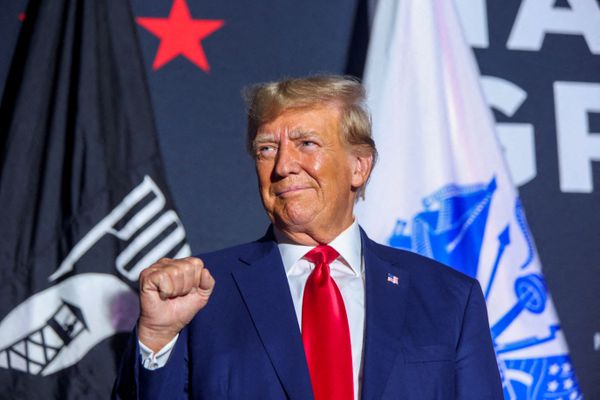Opinion: We aren’t as powerless over extremism as we may think

Former U.S. president and Republican presidential candidate Donald Trump greets the crowd during a campaign rally in Windham, N.H,. on Aug. 8.REBA SALDANHA/Reuters
Rob Goodman is assistant professor of politics and public administration at Toronto Metropolitan University and a former U.S. House and Senate speechwriter. He is the author of Not Here: Why American Democracy Is Eroding and How Canada Can Protect Itself.
Why is the Canadian right radicalizing, and why isn’t the Canadian left doing enough to stop it?
I want to convince you that that’s a fair question. I know it doesn’t look like one.
If you’re in the majority of Canadian voters who chose a left-of-centre party in the last federal election, the global success of the far right might keep you up at night, but it hardly feels as if you can do anything about it. You can keep voting against the Conservatives, but you know that their turn in power is coming eventually. In a virtually two-party system, it always does. And the question of what kind of Conservative Party enters power when that turn comes – a party basically reconciled to democracy, or something closer to America’s Republicans – can seem entirely out of your hands. You have no input into its choice of leader, its relationship with the nativist and anti-vax fringe, or into the networks its MPs are building with the global far right.
But the outcomes of these choices matter profoundly for our democratic future. For proof, look south, where Republicans are preparing to renominate for president the twice-impeached, thrice-indicted (and counting) Donald Trump. In a very real sense, it doesn’t matter if a majority rejects Mr. Trump again, as long as the once-and-future ruling party accepts him. So long as that’s the case, democracy isn’t the common ground on which politics is played out. It’s just one more polarizing issue.
In a broader view, as the political scientist Daniel Ziblatt has influentially argued, a key predictor of countries’ democratic health has been the state of their conservative parties. Can they play within the democratic rules of the game? “If this type of conservative political party fails to develop, or falters,” writes Dr. Ziblatt, “a key buttress supporting democracy is undermined.”
So those of us who are not conservatives still have a stake in what happens inside conservative parties. But having a stake in something doesn’t necessarily mean that we can do much about it.
Even as centre-left leaders such as Justin Trudeau and Joe Biden issue an escalating series of warnings about the “crisis of democracy,” their actions hardly show the urgency or creativity that such a crisis would seem to demand. For the most part, what they have to offer is increasingly apocalyptic rhetoric in the service of resolutely ordinary appeals: vote, donate, like, subscribe.
I think the reason the centre-left response to extremism is so disappointing is that its estimation of our collective power over extremism is actually quite low. It promises a world where it keeps beating the extreme right at electoral politics – not a world in which the extreme right is politically irrelevant.
Yet, a politics in which the only realistic outcomes are the status quo and the end of democracy is bound to be fearful, stagnant, dull. And in just this way, the persistence of the far right shrivels our political ambitions, as if avoiding the worst-case scenario were something worth dancing in the streets over.
To understand why it’s reasonable to aim for something more, it helps to see extremism not as a question of misinformation, conspiracy theories or bad character – but as a question of power. It is a strategy for winning power: Most notoriously, it was the strategy that many establishment conservative parties chose in interwar Europe when they made common cause with fascists. And it is a strategy for using power, one that is decisively shaped by the constraints that meet conservative parties, or fail to meet them, if and when they enter government.
Why does it help to think of conservative extremism in terms of power? So that those of us who are not conservatives can think more explicitly about using our power against it – about making extremism a losing strategy, and therefore less attractive over the long run as an option for conservative parties.
In other words, this is a democratic way of thinking about democratic crisis: one that places its trust not in better management of misinformation or in smarter experts, but in the uses and possibilities of collective power.
For one example, think of recent Ontario politics. Think of Premier Doug Ford: Is he an example of homegrown, norm-breaking right-populism, as some of his louder critics insist? Or is he simply a run-of-the-mill Tory? On the former side of the ledger, we might put his plan, last November, to override the Charter of Rights and Freedoms to strip collective bargaining rights from tens of thousands of education workers. On the latter, relatively “normal” side, we might put his hasty climbdown from that plan – a concession that some exercises of power, even for a Premier just re-elected with a strong mandate, are still beyond the pale.
The point is that it makes no sense to think of someone like Mr. Ford as embodying a certain fixed quantity of “populism” or “extremism.” Mr. Ford didn’t back down because he experienced a moral conversion or became an entirely different sort of politician overnight. He backed down because he had to – because education workers shut down Queen’s Park and Ontario public schools with a massive strike, and because organized labour could credibly promise to escalate to an even bigger general strike if necessary. If Mr. Ford decided to take his hands off the Charter, that’s not a reflection of his “normalcy.” It’s a reflection of the degree of counterpower his opponents could mobilize against him.
Unions are really good at that sort of thing. Because they have the institutional memory to put bodies in the streets on short notice, and because they embody generations of practice in the use of collective power against bosses and governments, trade unions have been on the front lines of protest against far-right governments from Israel to Brazil to Hungary.
We’d want them on the front lines here, too, in order to act as a check on any Canadian government, provincial or federal, that crosses a “red line” for democracy. But whether they could do so effectively depends on the strength of organized labour across Canada, and in particular, on whether Canada can reverse or slow the long-term decline that has brought union membership to its lowest point in decades.
If you’re a politician who claims we’re living through a crisis of democracy, what are you doing to get those numbers up, to build democratic safeguards that will outlast you? Are you making it easier for gig workers to unionize? Are you ensuring that workplace union elections are free, fair and shielded from employer intimidation? Are you breaking down legal barriers to larger, and so more effective, bargaining units?
If not, should we still take your “crisis of democracy” talk seriously?
The idea of unions as counterpower is one example of a broader point: We aren’t as powerless over extremism as we may think. And we should feel entitled to political leadership – inside and outside electoral politics – that would rather disempower extremism than have it around as a convenient foil.
This article has been archived for your research. The original version from The Globe and Mail can be found here.


